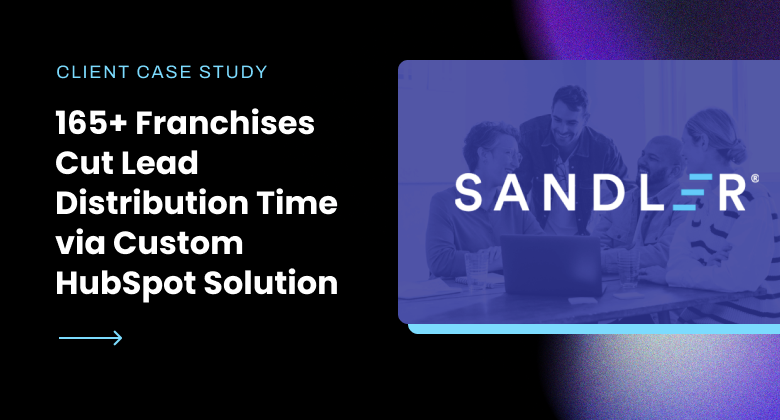HubSpot Inbound Marketing Strategy Delivery
What to Know About HubSpot Brands: Features & Benefits
08/04/2023 • 6 min read • Written by Corie Stark
Table of Contents
In the world of digital marketing, managing multiple brands under a single umbrella can be a daunting task. This is where HubSpot Brands come into play. They offer a solution for managing branding, data, visibility, and access across multiple brands within a single HubSpot portal.
What is the HubSpot Brands Feature?
HubSpot Brands is an add-on feature that allows you to create and manage multiple brands within a shared HubSpot portal across various tools. This feature is designed to help you maintain clear swimlanes for each brand. It ensures each maintains its unique identity (think: logos, fonts, meeting links, content, etc.) while benefiting from a unified management system.
Each brand is associated with a specific domain, which serves as the address of your website. This association allows you to build custom-branded experiences and effectively report on performance at both the parent company and individual brand levels.
Who Should Use HubSpot Brands?
HubSpot Brandare ideal for companies with multiple brands that wish to manage individually under one main account or portal. They're also beneficial for organizations requiring separate permissions or email subscription preferences for each brand.
However, there are scenarios where multiple HubSpot accounts might be more suitable. Consider this if:
- You have any legal or compliance restrictions/concerns between brands.
- You shouldn't share your contact data and information between brands.
- You want to host data in different global regions.
- You operate multiple independently owned companies.
- Your sales, marketing, or operations processes/lifecycle stages/workflows/objects are very distinct between brands.
Features of HubSpot Brands
HubSpot Brands come with a range of features designed to streamline the management of multiple brands. These include:
- Segmenting Audiences: You can segment audiences for each brand, making it easier to target specific groups without spending hours building lists.
- Creating Teams & Permission Sets: You can create teams for various roles and brands, helping to organize the hierarchy of your HubSpot users for reporting and partitioning purposes.
- Partitioning HubSpot Assets: You can assign Brands to your HubSpot assets, helping keep your portal organized and error-free. Assets you can partition include CRM records and views, conversations inbox, deal and ticket pipelines, social accounts, files, dashboards and reports, properties, blog articles, landing pages, website pages, emails, forms, calls-to-action, workflows, lists, and ads.
The Benefits of Using Brands
The decision to use HubSpot Brands has many benefits that can significantly enhance your brand management strategy. These benefits streamline your operations and provide a more organized and efficient way of handling multiple brands.
Before we delve into the key benefits, it's essential to understand that using Brands is not just about managing multiple brands. It's about unlocking the potential of your HubSpot portal to drive efficiency and growth across your organization. Whether you're a business owner or a marketer, Brands can help you juggle different brand accounts, manage website edits, social media, email marketing, sales, and customer service all in one place.
- Branding - HubSpot Brands allow you to separate two or more brands under one portal. This separation ensures that each brand maintains its unique identity and customer experience. With the ability to customize brand kits within HubSpot, you can have logos and colors built into every Brand maintaining every distinct brand identity while managing it all in one place. Added bonus: Brands allow you to categorize and filter webpages, landing pages, emails, forms, and more by each unit, so you no longer need to rely on intricate naming conventions to locate something.
- Data and Reporting - With Brands, you can associate specific assets, such as forms and emails, with individual brands. This feature allows you to track performance and understand how one brand performs over another from an email marketing perspective. The campaign can be tied to a specific unit, providing an easy way to report performance.
Additionally, Brands simplifies campaign management by allowing you to delineate contacts by brand or expand your target audience to cross-sell and upsell campaigns across your whole customer base. - Visibility and Access - Brands control what people can see and access within the larger organization. This feature is handy for companies with teams working across multiple brands. With HubSpot's partitioning feature, you can limit who can view, edit, or delete contacts, companies, deals, or tickets. You can also restrict who can see and interact with workflows and who can modify and use sales enablement tools.
- Cost Savings and Efficiency - One of the most significant advantages of using Brands is the potential for cost savings and increased efficiency. By managing all brands under one roof, you can save on subscription costs and reduce the time spent jumping between different portals.
- Advanced Marketing Tools - With a Marketing Hub Enterprise subscription (required for this feature), you can access advanced marketing tools, analytics, and settings, including partitioning, predictive lead scoring, and custom objects.
How to Set Up Brands
Setting up Brands involves associating assets with the units to keep your assets organized by brand. After setting up your different brands, you can associate assets such as brand domains, forms, pages, and more.
When associating your assets with individual units, make sure the brand domain is connected first. Campaigns, emails, and forms can only be associated with brands when being created. While all other assets can be reassigned, it is not possible to reassign an email or form once created.
Making the Right Choice: Brands, Domains, or Multiple Accounts
Choosing the right option to manage and organize your brands can be complex. Here are some factors to consider:
- One HubSpot with Brands: This option is ideal if you want to host content on multiple domains, work on brands under the same ownership, send emails with distinct subscription preferences for each brand, have prospects or customers that overlap across brands, cross-sell or upsell contacts across your brands, share marketing campaigns, assets, or templates across brands, have brands with shared products or services, regularly compare campaign performance across your brands, have the same marketers work across your brands, have the same web developers work across your brands, and are working across multiple international markets.
- One HubSpot with Domains: Try this if you want to host content on multiple domains, work on brands under the same ownership, have prospects or customers overlap across brands, have the same web developers work across your brands, work across multiple international markets, and want to share marketing campaigns, assets, or templates across brands.
- Multiple Accounts/Portals: As noted earlier, this option is best if you want to send emails with distinct subscription preferences for each brand, have brands that want to host their data in different global regions, operate multiple independently owned companies/franchises, want to receive separate bills, cater to brands with separate CRMs, and have legal boundaries between your brands that shouldn't be breached.
Get Started With Brands
HubSpot Brands offer a powerful solution for managing multiple brands under a single portal. They provide the tools necessary to maintain brand identity, manage data, and control visibility and access, making them an invaluable asset for any multi-brand company.
If you need help setting up or managing your HubSpot Brands, don't hesitate to reach out to someone from Lynton. Our team of experts is ready to assist you in maximizing the potential of your HubSpot portal. Note: HubSpot Brands was previously known as HubSpot Business Units.
By: Corie Stark
After spending many years as a sports journalist, Corie switched to marketing in 2013. Her love of writing, talking to people, and keeping up with the industry enables her to use her skills for anything from social media to long-form blogging. Outside of work, she enjoys hiking with her dogs and making her cats chase the ever elusive red dot.
You May Also Like

Sales & Marketing
7 Ways to Create a Scalable Multi-Brand Lead Management System
Learn 7 proven strategies to build a scalable lead management system across multiple brands, eliminate tracking gaps, and inc...
Keep Reading
HubSpot
How to Use HubSpot for Franchises
Learn how HubSpot's powerful tools streamline franchise management, automate lead distribution, and maintain brand consistenc...
Keep Reading
HubSpot
HubSpot Reporting Best Practices for Franchise Lead Rotation
Learn essential HubSpot reporting strategies for franchise lead rotation. Discover key metrics, best practices, and tools to ...
Keep ReadingSubscribe Today


